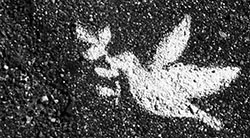
The weekly portion, B'haalot’cha, is sealed with what seems like a side story:
"Miriam and Aaron spoke against Moses because of the Cushite woman he had married: 'He married a Cushite woman!' They said, 'Has the Eternal spoken only through Moses? Has God not spoken through us as well?' The Eternal heard it." (Num. 12:1-2)
I'm curious about Aaron's role in this story. Does he take an active role in this act of gossip or is he only a listener? The Hebrew source of this story seems to be deliberately misleading: vat’dabeir Mir’yam v’Aharon... Is it only Miriam who is talking or is Aaron also responsible?
The question becomes more acute when we notice that only Miriam is punished, though God explicitly rebukes them both.
It's hard being “the brother of ...”
In most biblical traditions, Aaron is portrayed as a supporting actor in the great performances of God and Moses. The biblical character of Aaron lacks outstanding characteristics, and this invites those who study the Torah to offer unique personality traits that are so noticeably absent from the story.
One of the more surprising suggestions for embellishing Aaron's incomplete personality is found in the words of Hillel the Elder:
"Hillel would say: Be of the disciples of Aaron – a lover of peace, a pursuer of peace …" (Pirkei Avot 1:12).
A written, historical riddle
Hillel's words can be categorized as a written, historical riddle. The connecting bridge between biblical Aaron and Hillel's depiction of Aaron is built out of revealed and concealed desires, out of anxieties and political struggles, all of which the Mishnah attempts to cover up in its simple and naive style. How did the anemic character of biblical Aaron transform into Hillel's pursuer of peace? Furthermore, what characterizes this "pursuing peace" of which Hillel speaks? What is "peace" and how is it "pursued"?
Large portions of B’haalot’cha are dedicated to Aaron and his descendants, the priests. Therefore, this week we will follow in the footsteps of the literary riddle composed by Hillel the Elder.
How is peace pursued?
The phrase "pursuer of peace" (rodef shalom) is an oxymoron composed of two contradictory words. The root word reish-dalet-fei appears in the Bible more than 100 times and, almost always, in a warlike context. For example: "The enemy said, 'I will pursue, I will overtake" (Ex. 15:9).
But this root word does appear a few times in the context of peace, for example, in the source from which Hillel took the phrase, pursuer of peace: "Who is the man who desires life... Depart from evil, and do good; seek peace, and pursue it" (Psalms 34:13-15).
The poet who authored Psalm 34 and forged the phrase, pursuer of peace, envisioned a special quality of peace; a quality built not only on avoiding violence, but also from enlisting violent energies for the sake of peace.
There are a few biblical hints that make possible a connection between the biblical character of Aaron and the pursuer-of-peace role that Hillel the Elder attributes to him. One such allusion appears in last week's Torah portion, Naso, in the language of the Priestly Blessing (Num. 6:23-27):
"Speak to Aaron and his sons: ,’Thus way you shall bless the people of Israel. Say to them: The Eternal bless you and protect you. The Eternal deal kindly and graciously with you. The Eternal bestow [divine] favor upon you and grant you peace.’ ”
And how was Aaron a pursuer of peace?
The Talmud explains:
"Two people were having a quarrel. Aaron went and sat with one of the disputants and said to him, 'My son, look what your friend is saying; he is distraught and is tearing his clothing.' The disputant says, 'Woe to me! How can I look at my friend and see his shame as I am the one who has wronged him.' …" (and Aaron is doing the same with the other disputant) "When the two met each other, they hugged and kissed in reconciliation" (Avot D’Rabbi Natan, version A, chapter 12).
Is the road to peace paved with lies?
Aaron’s pursuing of peace moves forward in small steps, with individual counseling: One person, then another person, then another. With this description, does the author of this midrash seek to minimize the totality of Aaron's roles and character from that of a great leader and partner of Moses to that of a mere private psychologist? Does this minimization originate in the polemical perspective of the Pharisees (and that of their Rabbinic descendants) who sought to reduce the priests’ role in the greater leadership and present priests as good people, but also as irrelevant for leadership?
And, it is impossible to ignore that Aaron chooses deception as a strategy for achieving peace. Peace is an end that justifies the means.
The blind man of peace
The conflicted character of Aaron is highlighted by the weekly Torah portion, which focuses on the famous story of jealousy and competition between the older siblings of Moses (quoted above).
In this embarrassing, yet very human story. Aaron and Miriam are jealous of their younger brother's success and that jealousy is translated into stinging gossip about, "the Cushite woman he had married."
As in the story of the Golden Calf, here Aaron avoids taking responsibility, "And Miriam and Aaron spoke..." Aaron's character begins to show signs of being weak and tricky, a leader who has lost himself and his sense of stewardship: instead of committing acts of truth, he stands and gossips about the bold and successful leader.
Aaron is presented as a leader who sits on the fence to see how things will develop. Only when Miriam is punished and Aaron fears that the evil will befall him as well, does he grow a backbone and request: "O my lord, account not to us the sin which we committed in our folly” (Num .12:11). Aaron escapes punishment, but the possibility to demonstrate leadership escapes from Aaron.
Two models for a “man of peace”
From Hillel's words in Pirkei Avot, from the aggadah on pursuing peace in Avot D’Rabbi Natan, and by virtue of the wonderful possibility provided by filling the gap between the biblical character of Aaron and the character granted to him by Hillel the Elder, I propose two models for the man of peace from those days at this time.
1. The figure of the man of peace is built out of a perception of weak leadership. According to this interpretation, the man of peace is one who does not wage war. In our day as well, it seems that sometimes a connection is made between the traits of weakness, cowardice, and a lack of charisma, and values of compromise and peace.
Simultaneously, men of war seem full of power, with abundant energy and fitness to lead. Is it out of these human molds that Hillel created the connection between the weak biblical character of Aaron and his character as a man of peace?
2. An opposite model of a pursuer of peace suggests that bringing about peace is an extremely powerful activity -- activism for peace. The choice in the path of peace requires constant focus, personal and communal belief, and nonstop activity and action.
The man of peace sometimes deals with minor details, but they are the essence of peace activism. We must remember that there is a zealous aspect to the biblical and historical character of the priests; Levi who slaughtered the people of Shechem, Pinchas the Zealot, and the Maccabees.
According to this model, the zealot is the appropriate person to be a man of peace, as he has the characteristic of the pursuer, without which the man of peace could not exist. According to this view, only a person with the potential for zealotry can transform into a leader for peace. Hillel's reading "a student of Aaron ... pursuing peace" is an attempt to sublimate the characteristics of the sons of Levi for the sake of the culture of peace.
Do I want to subdue my own desire?
I am reminded of the words of Ben Zoma in the Mishnah: "Who is strong? One who conquers his own will" ( Pirkei Avot 4:1). Ben Zoma asks us to focus the powers of military domination inwards on ourselves. And I, who always oppose the effort to conquer the will of creativity and desires, this time find myself aligning with hope and with prayers toward Ben Zoma's words: conquering the desire that seeks to conquer the other rather than conquering other desires; sublimating the will for war for those that give us worlds of creation, of self-expression, and of activities of peace filled with power.
(This article was translated with the help of Uzi Bar Pinchas.)
I n her excellent commentary on Parashat B’haalot’cha, Dr. Weiss focuses her attention on the role of Aaron, and particularly his development in the Rabbinic literature as a “pursuer of peace.”
n her excellent commentary on Parashat B’haalot’cha, Dr. Weiss focuses her attention on the role of Aaron, and particularly his development in the Rabbinic literature as a “pursuer of peace.”
However, there is another interesting lesson to be derived from the portion. In Numbers chapter 8, there is a description of the divine cloud and divine fire that guide the Israelites through the wilderness. When the cloud or fire signaled it was time to camp, they encamped; and when the cloud or fire lifted and moved forth, the Israelites broke camp and followed the cloud or fire (see Num. 9:15-23). The appearance of the cloud and the fire occurs several times in the Torah and signals the divine guidance of the people on their journeys.
It is therefore puzzling that Moses asks his father-in-law to remain as their guide through the wilderness. Numbers 10:31 states that Moses begs his father-in-law, “Please do not leave us, inasmuch as you know where we should camp in the wilderness and can be our guide.” But we have literally just been told in the same chapter that God provided fire and cloud to guide the people and show them where to camp! The Sages of the Talmud respond to such puzzles by saying that the lesson here is that “one should never rely on miracles” (Babylonian Talmud, P’sachim 64b). In other words, although there was a divine cloud and fire, Moses knew that having a good and knowledgeable wilderness guide was equally important!
With these insights and others, the Sages created a Judaism that venerated prayer and faith, but demanded practicality and human effort as well. Exodus 15:26 says that God is our healer, but Jewish tradition demands that a sick person consult a physician. Jacob may have prayed to God for deliverance from his brother Esau, but Genesis 32:8 shows that he also prepared for war and escape. One of the great strengths of Jewish tradition is that it is willing to live both with faith and with practical effort on our own behalf. We offer a Mi Shebeirach for the ill, but we have them treated by physicians and we follow the latest in medical practices. We may pray before a big job interview or academic test, but we know that nothing beats genuine preparation and study.
Similarly, as Dr Weiss points out, seeking peace and pursuing it is very much a human activity, exemplified by Aaron himself. We may sing “Oseh Shalom” or “Shalom Rav” and pray as a community for peace, but we are obligated, as Aaron shows us, to create peace in the world ourselves.
B’haalot’cha, Numbers 8:1−12:16
The Torah: A Modern Commentary, pp. 1,075−1,100; Revised Edition, pp. 950−973
The Torah: A Women’s Commentary, pp. 843–868
Haftarah, Zechariah 2:14−4:7
The Torah: A Modern Commentary, pp. 1,259−1,261; Revised Edition, pp. 974−976

